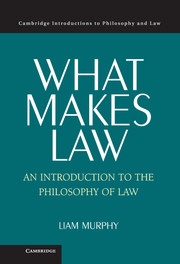2 - Morality and the Grounds of Law
Published online by Cambridge University Press: 05 July 2014
Summary
Adjudication and the Grounds of Law
The main traditional dispute about the nature of law, and the one that is the main focus of this book, is a dispute about what morality has to do with figuring out the content of the law in force in any particular place.
On the one hand we have matters of fact, such as the meaning of what is written in some document that is issued by some legal institution such as a legislature. On the other hand we have moral considerations, in the broad sense that includes not just individual right and wrong but also normative political theory (about, say, social justice or the proper limits of state power). Everyone thinks that matters of fact are relevant to determining the content of current law. The main dispute about the nature of law is a dispute about whether moral considerations are also relevant. This is a dispute about what Dworkin (1986, 4) called the grounds of law – of what makes legal propositions true.
This dispute is obviously distinct from the question of whether moral judgment does or should influence those who make law. We can take for granted that it should and to some extent does. The question is whether moral considerations are relevant to figuring out what the law already is.
What may not be so obvious is that the issue of the grounds of law is also distinct from that of whether judges should appeal to moral considerations when adjudicating disputes. Explaining this contrast is perhaps the best way to bring the traditional debate about the grounds of law into focus.
- Type
- Chapter
- Information
- What Makes LawAn Introduction to the Philosophy of Law, pp. 7 - 22Publisher: Cambridge University PressPrint publication year: 2014



